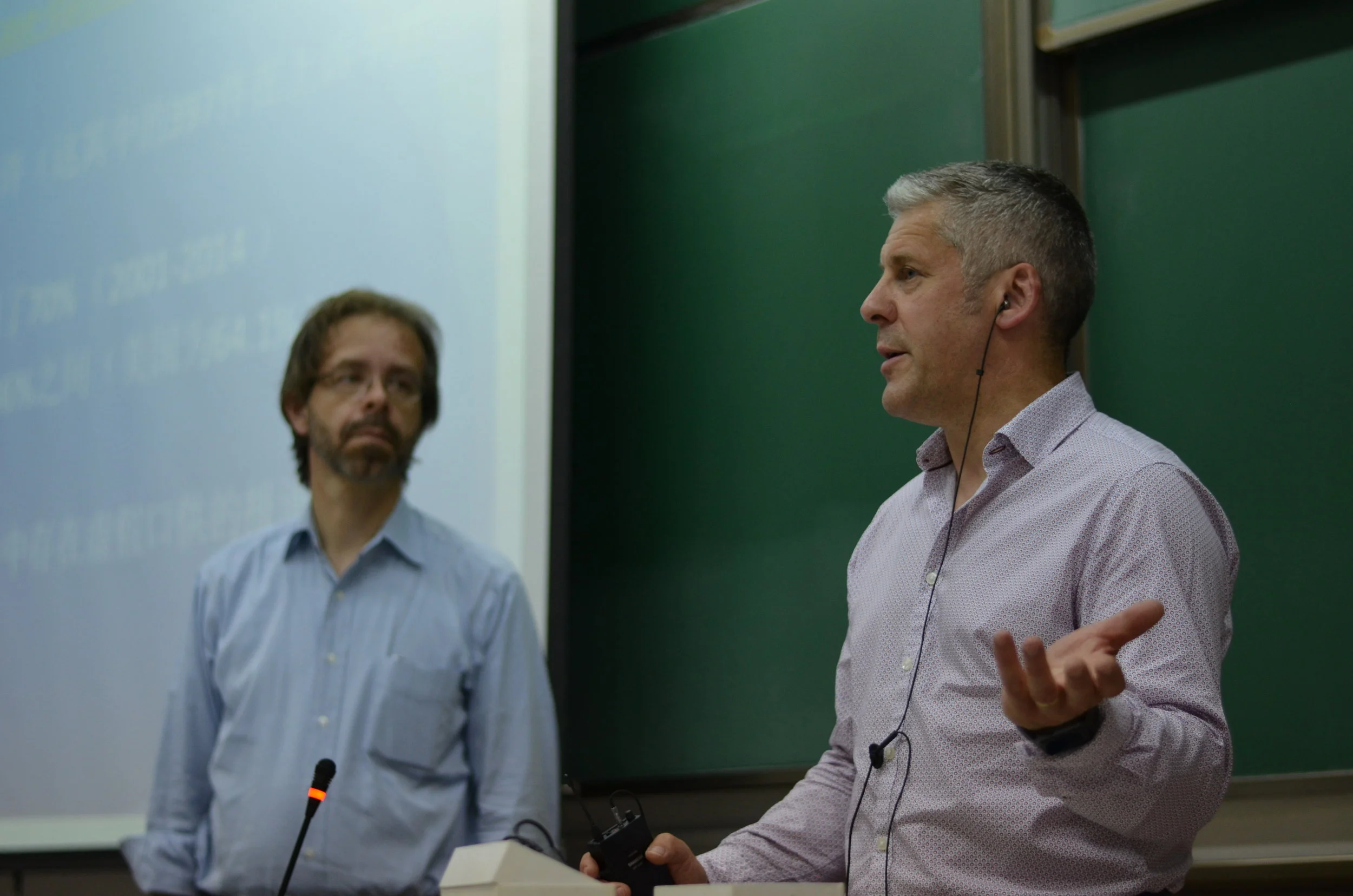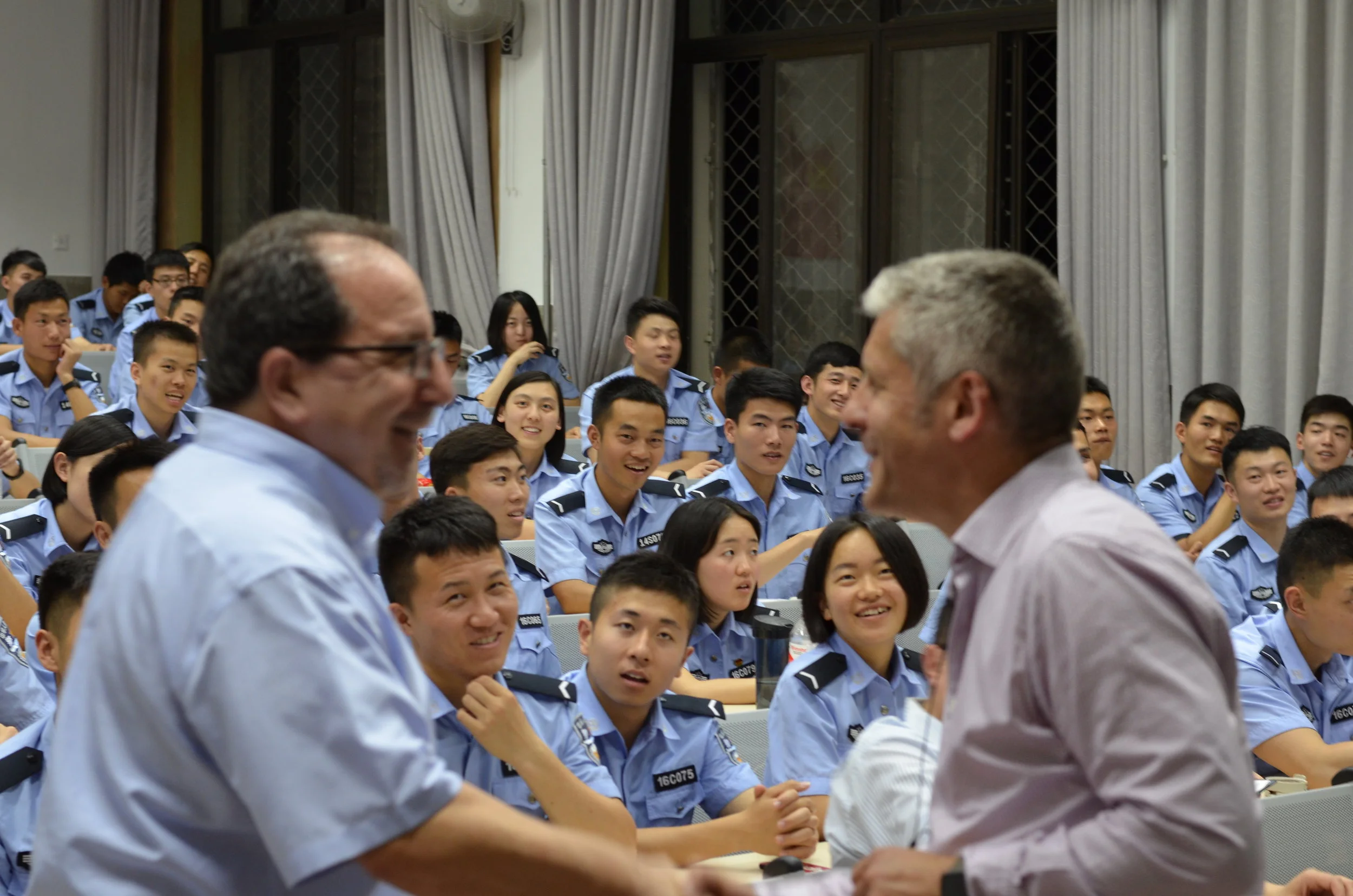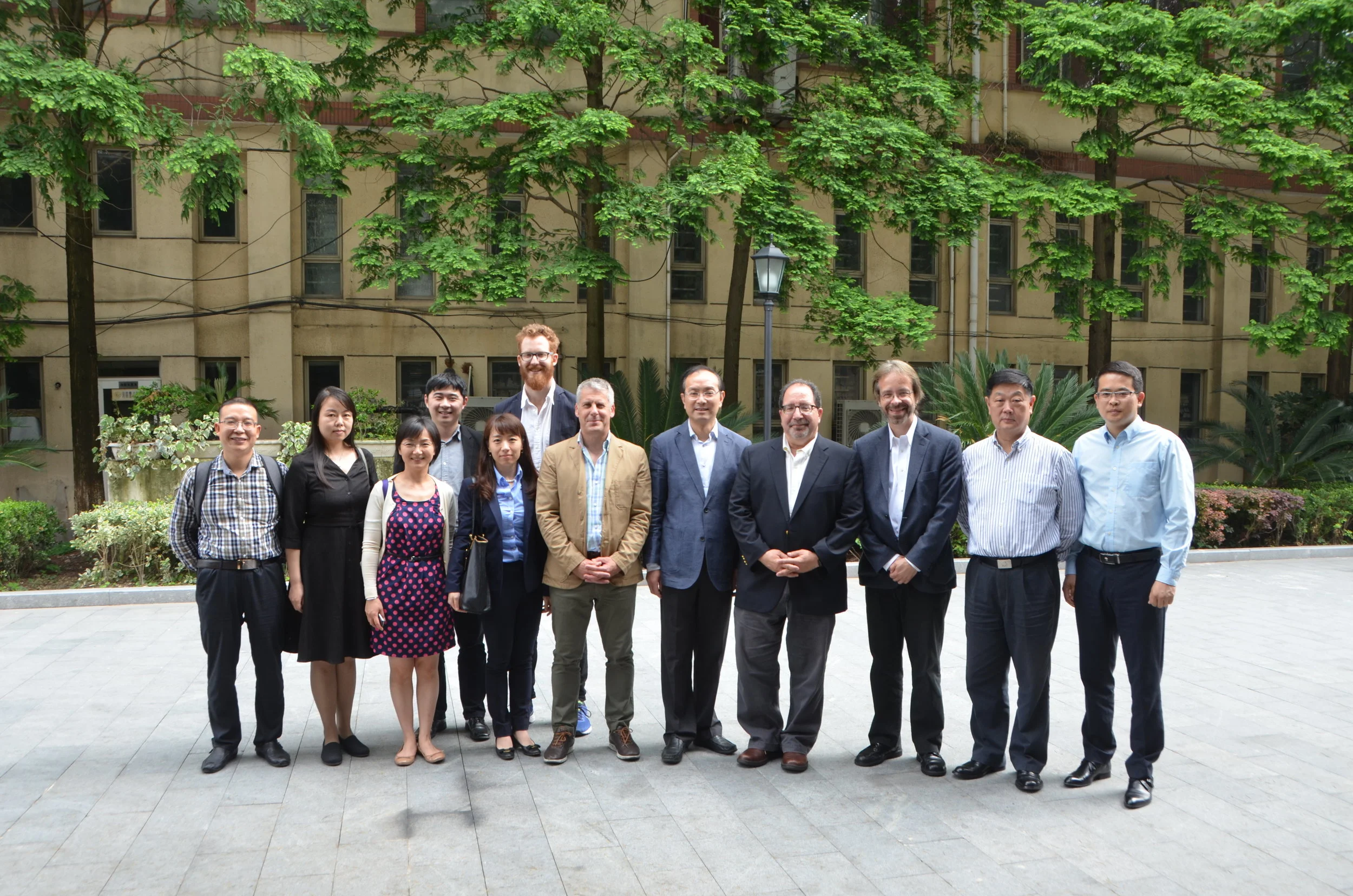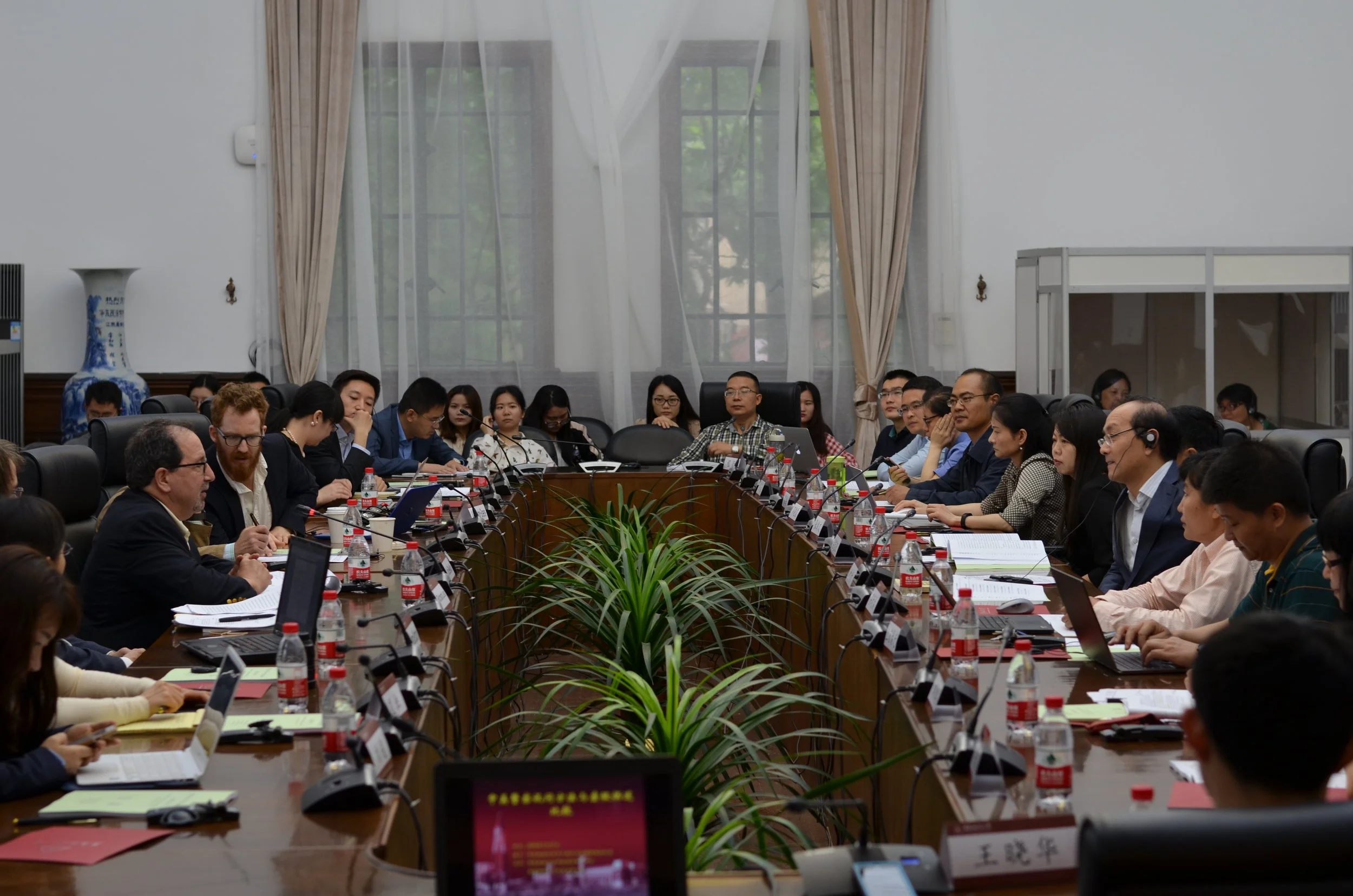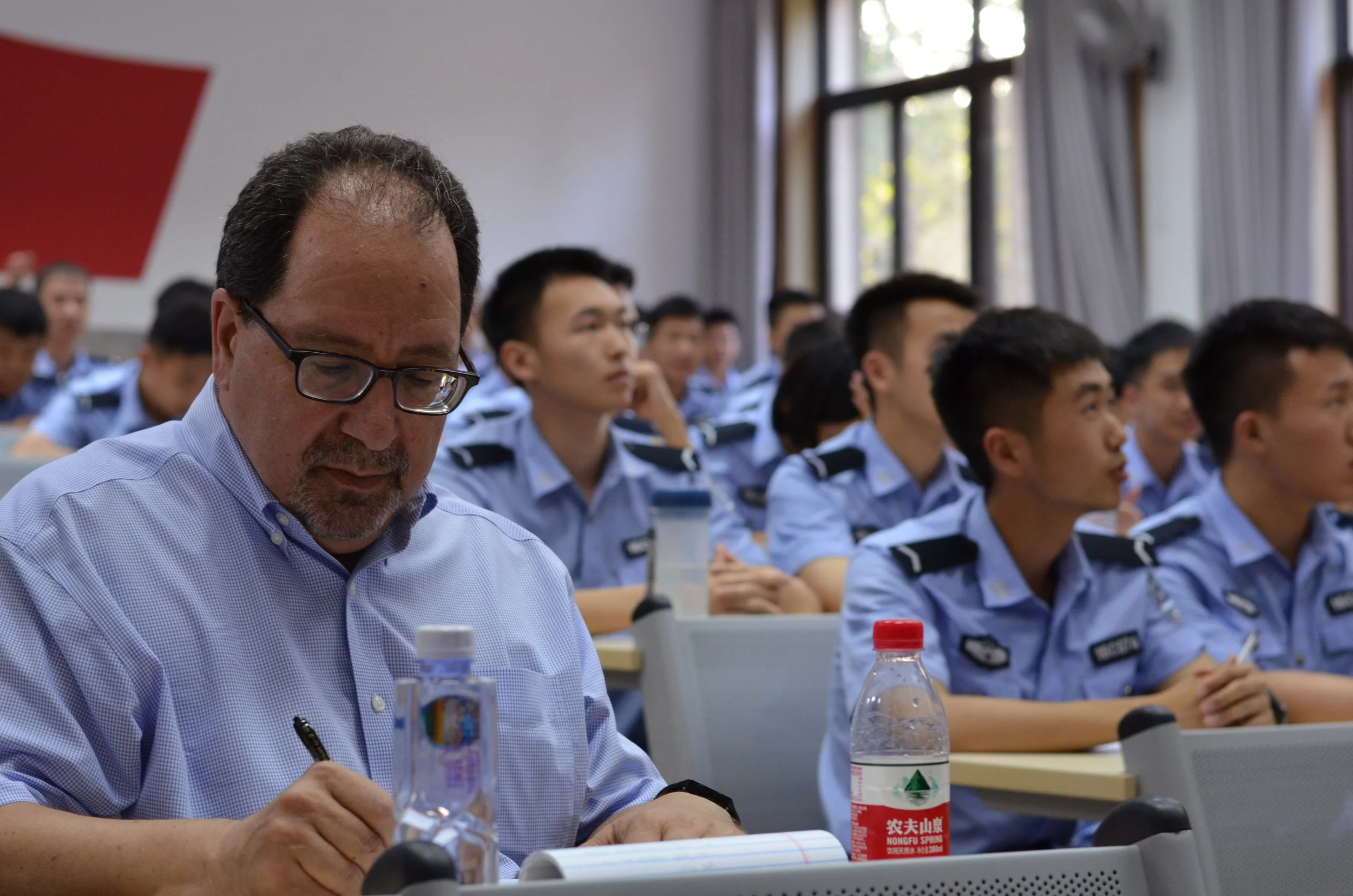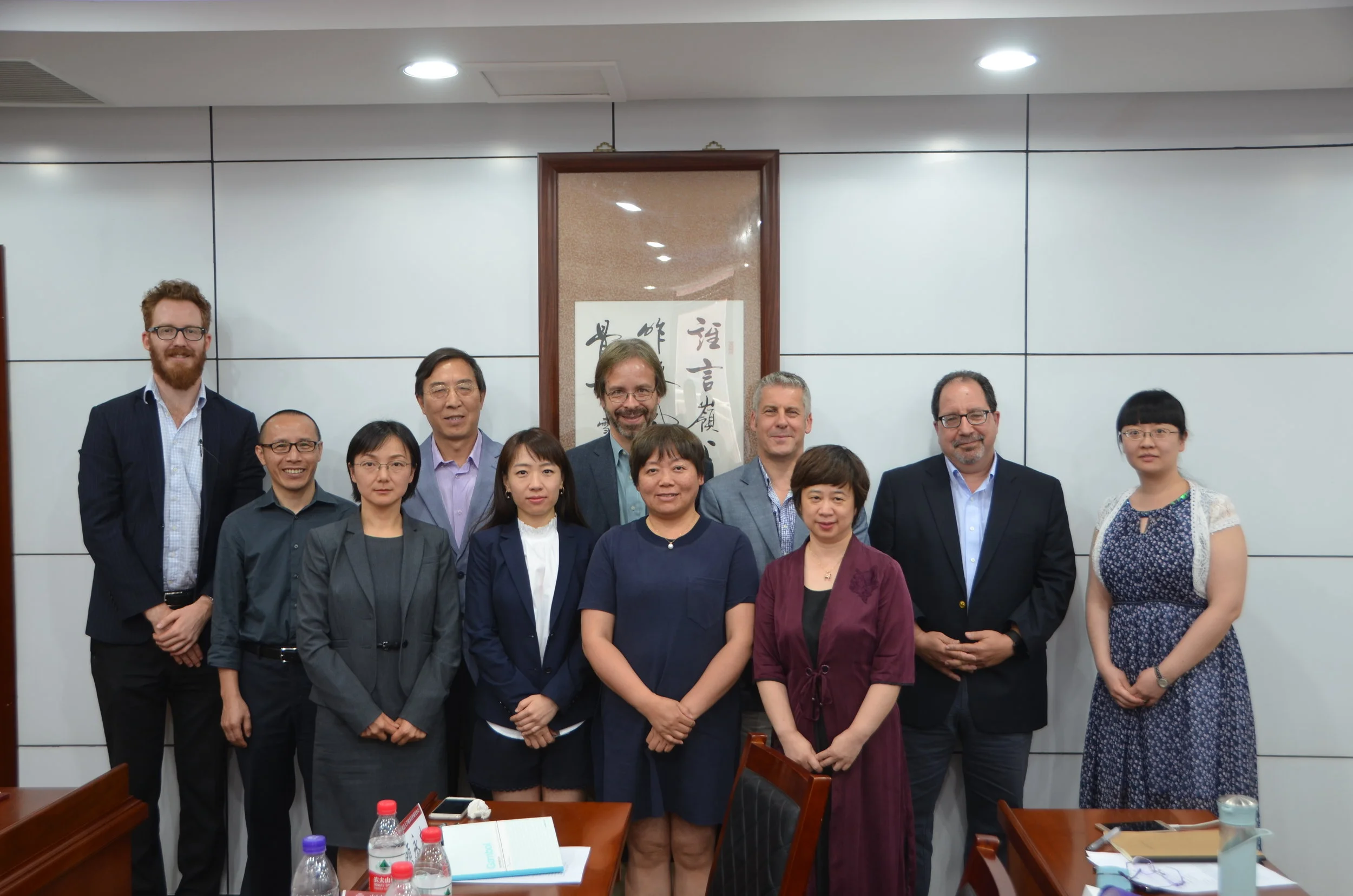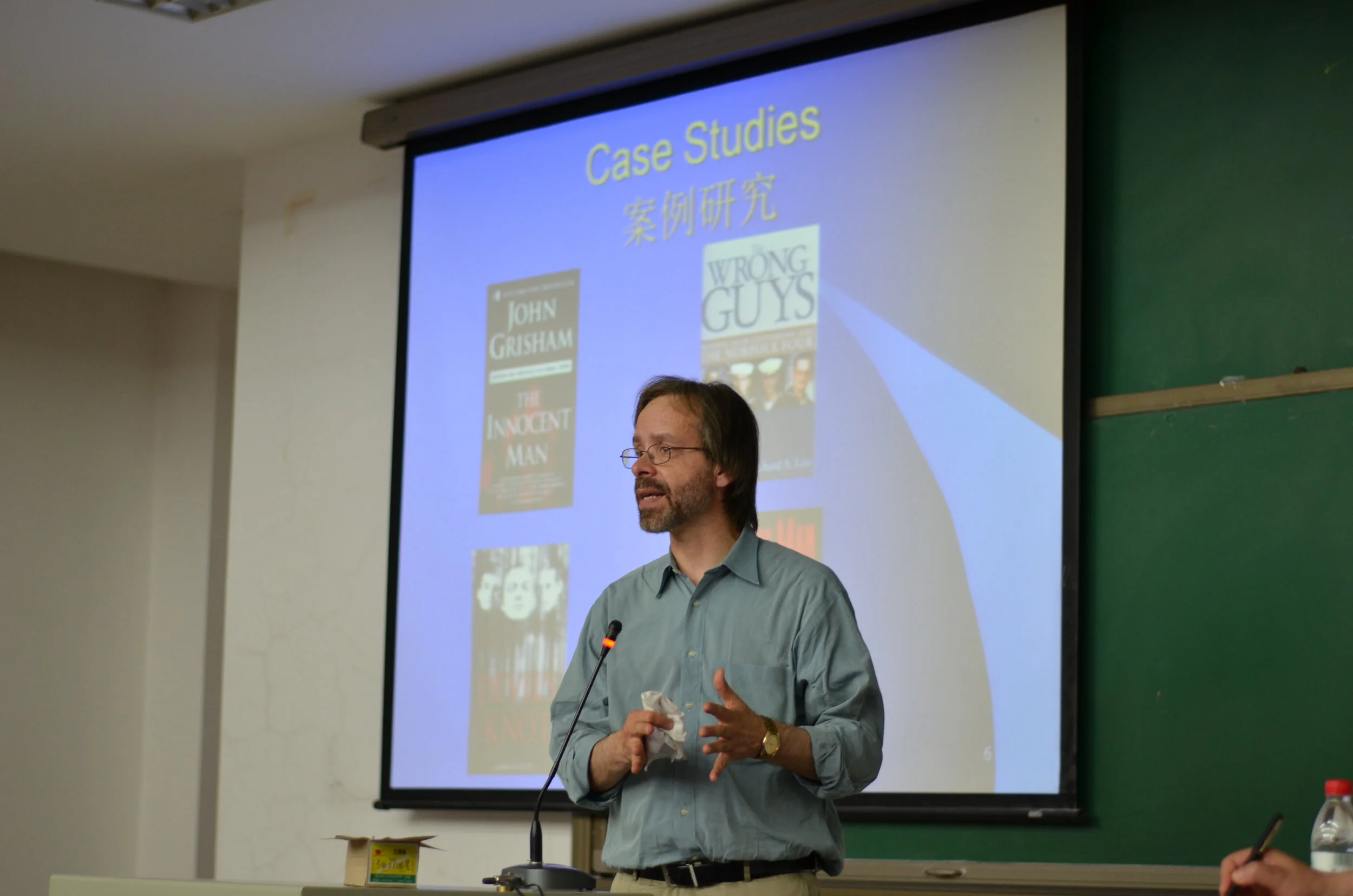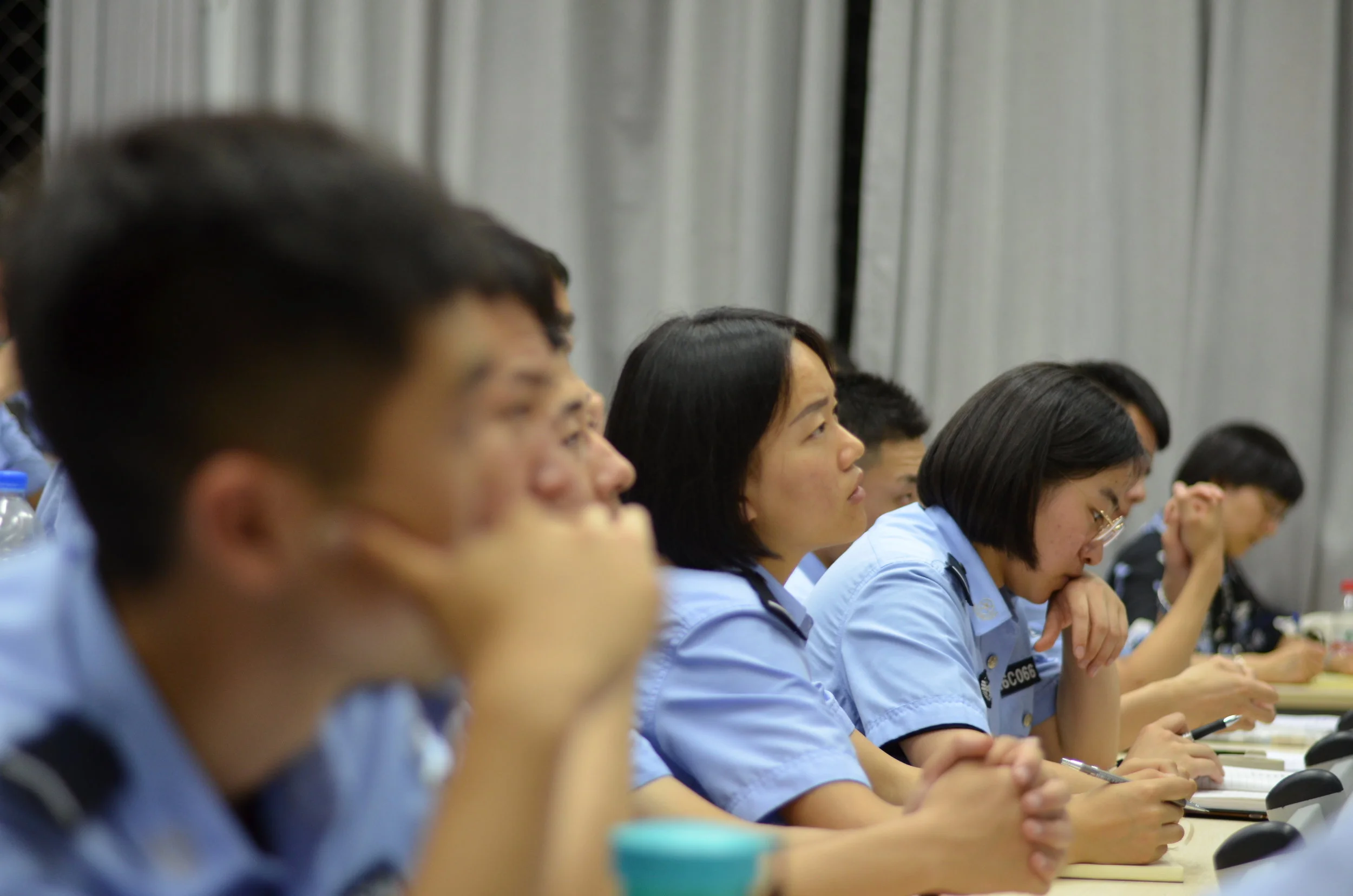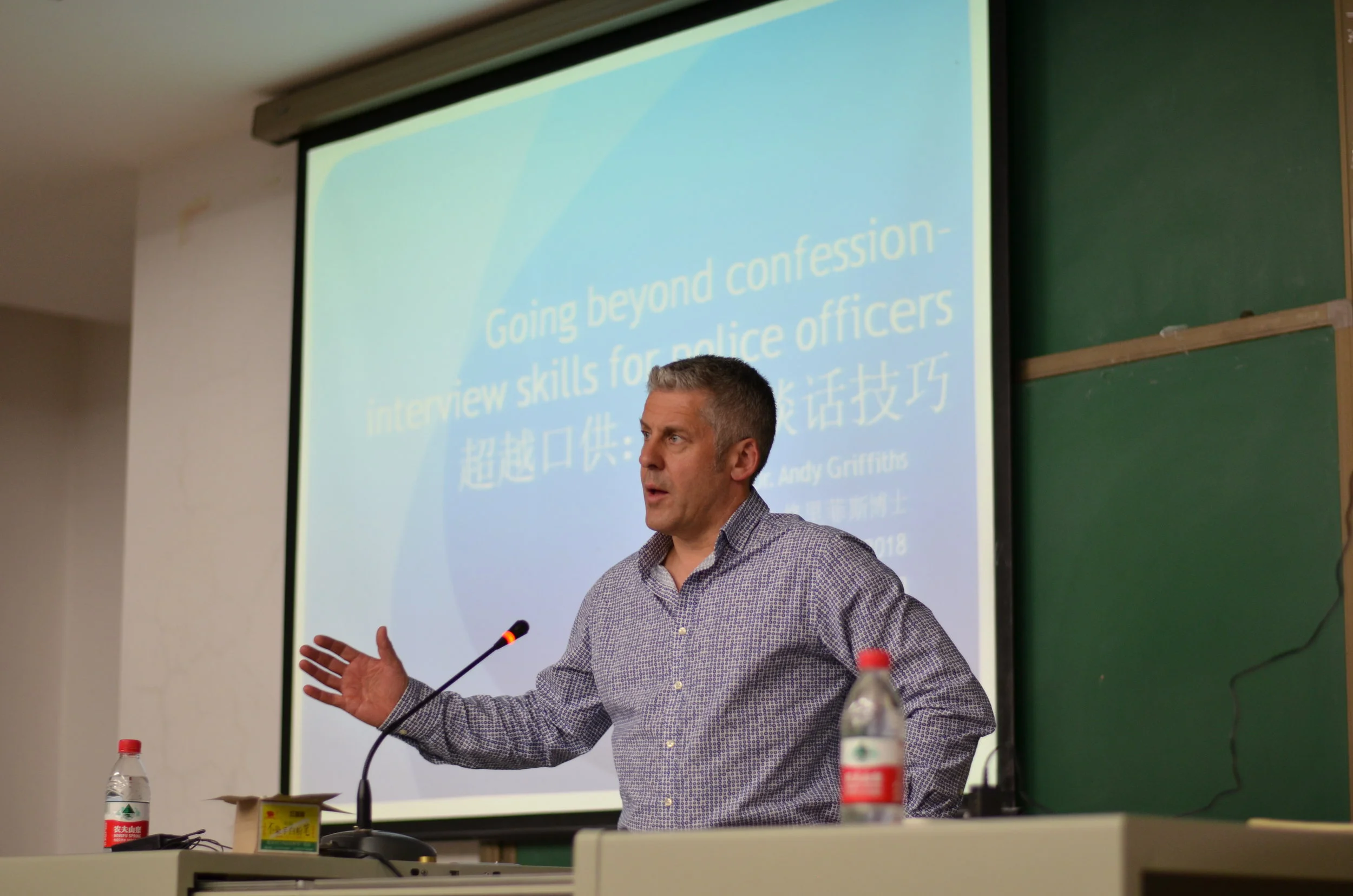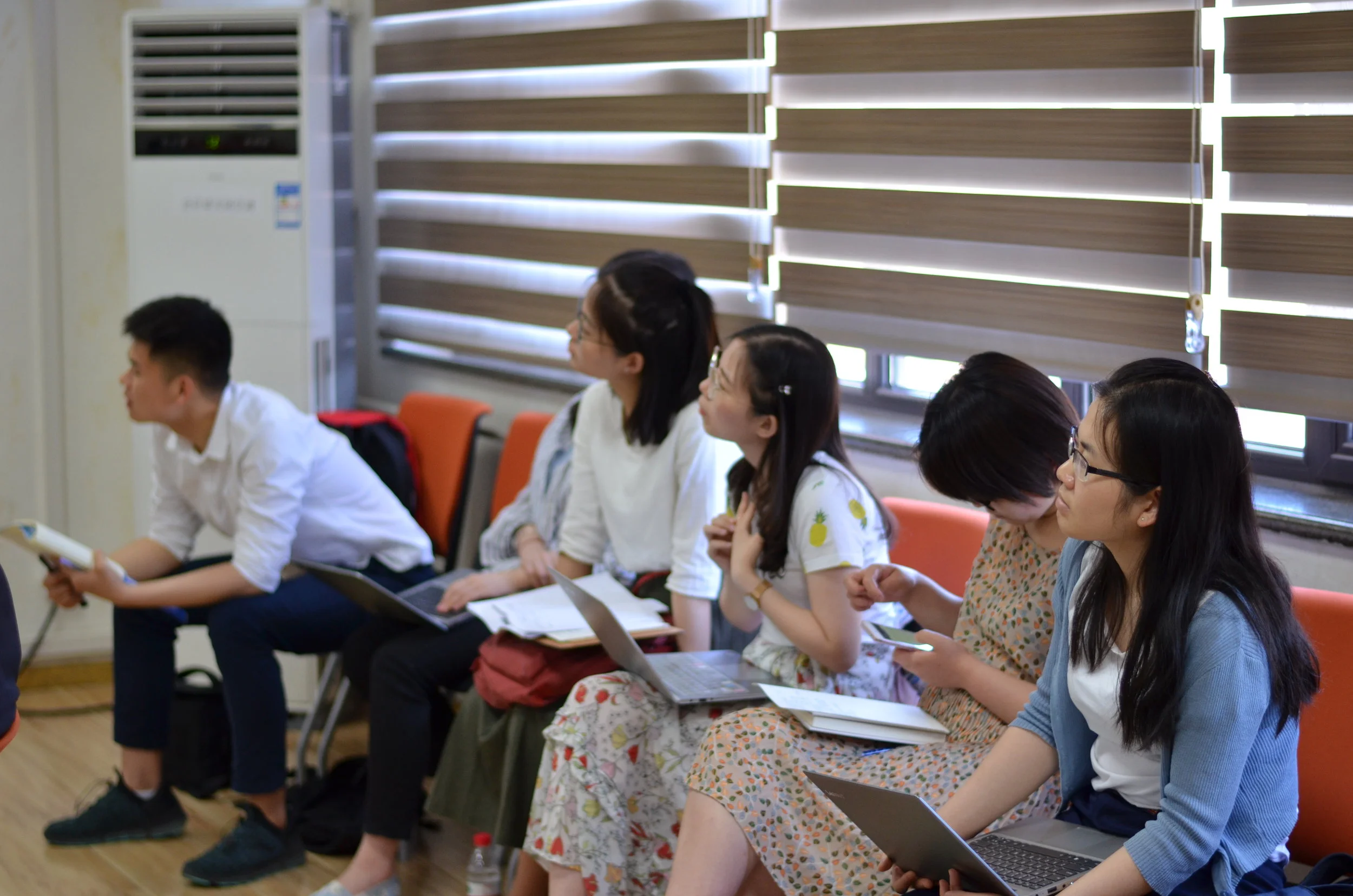(L-R): Professor Richard Leo and Dr. Andy Griffiths presenting at People's Public Security University.
In May 2018, the U.S.-Asia Law Institute (USALI) traveled to China as part of its continuing program to work with partners in Asia to prevent and redress wrongful convictions. Working with Chinese partner institutions, we convened several events in Beijing and Shanghai to share the research and expertise of Western scholars on one of the leading causes of wrongful convictions in the U.S. and around the world: false confessions. We were fortunate to be able to invite to China two of the world’s leading experts on the subjects of false confessions and police interrogations: Richard Leo, Professor of Law and Psychology at the University San Francisco School of Law and Andy Griffiths, a former Senior Investigating Officer with the UK police. Professor Leo provided a thorough analysis of how false confessions occur and Dr. Griffiths offered a viable solution based upon the experience of the United Kingdom.
Over five days, Professor Leo and Dr. Griffiths spoke to audiences and exchanged views with scholars and students at China’s People’s Public Security University, East China University of Political Science and Law (ECUPL), Beijing Normal University, China University of Political Science and Law (CUPL), and Renmin University. The lectures and program are part of USALI’s ongoing work on the prevention and redress of wrongful convictions, on which the Institute has previously hosted numerous lectures and training sessions at home and abroad.
The presentations from the two experts worked together to address the issue. In Professor Leo’s own words, “I present the problem, and [Dr. Griffiths] the solution.”
Professor Leo approached the issue of false confessions through his background in psychology, describing many of the root causes and problems that exist during the interrogation process, as well as their impact on suspects and their role in leading to wrongful convictions. Professor Leo showed how, contrary to the assumptions of juries, judges, and the public, who cannot imagine confessing to a crime they didn’t commit, innocent people do falsely confess. With reference to video clips drawn from real life cases – including the case of Brendan Dassey, made famous by Netflix’s Making a Murder series (for whom Leo was an expert witness) – he broke down the factors which cause false confessions to occur so frequently. Please click this link to read more on Brendan Dassey or click this link to find out more about Netflix's Making a Murder series.
While some stem from exacerbating factors such as the suspect’s age or low cognitive ability, the primary cause of false confessions is the way police conduct interrogations. The use of lengthy interviews and various tactics designed to obtain confessions, as opposed to simply gathering information, sometimes lead even innocent persons to make a false confession. These tactics include false evidence ploys – “we found your fingerprints on the murder weapon” (when that is not true), promises and threats – “if you just confess you can go home,” and minimization – “we know you simply acted out of anger and wouldn’t ordinarily do anything like this.” These are all powerful tools used to obtain confessions from suspects. In fact, they are so powerful that police trainers make clear that they should only be used on individuals “known to be guilty” who refuse to confess. As Professor Leo pointed out, however, study after study shows that it is impossible for the police to distinguish a true denial from a false one. Professor Leo discussed how police errors in the interrogation process can increase the likelihood of false confessions.
The problem of false confessions thus fully laid out, Dr. Griffiths’ presentation discussed the practices and tactics during the interrogation process that can help to mitigate these risks. According to Dr. Griffiths, the British experience has shown that when interrogating suspects, you cannot simply try to get better at how you obtain confessions, but rather must shift away from a focus on obtaining a confession at all. Instead, interrogation should be thought of as a fact-finding mission, with the aim of collecting a body of facts which serve as leads to obtain further evidence around which to build a case. The investigation will then either contradict or confirm the suspect’s story. In Dr. Griffiths’ own words, “a confession is no substitute for good police work,” and that means building a case through evidence.
According to Dr. Griffiths, these insights form the basis for what Britain has dubbed the PEACE method of suspect interviews, a system Britain pioneered and has implemented with great success involving a focus on building rapport, engaging suspects with an open mind, and allowing them to tell their version of events. Throughout his presentations, Dr. Griffiths emphasized that the successful use of this interrogation process – of any interrogation process – is a skill-set that must be learned and honed through rigorous training. As a former detective, Dr. Griffiths was able to tailor his presentation to the audience of each talk. When speaking before the young students and future police officers at the People’s Public Security University, he focused on what they could do to become effective and responsible officers, and the importance of professional and respectful interrogation involving building good rapport with suspects. When speaking to leading criminal procedure legal academics at law schools in Beijing and Shanghai he went into greater depth analyzing the policy and system reform measures which can be taken.
To demonstrate the effectiveness of the PEACE method, Dr. Griffiths used a notorious murder case in which the defendant never confessed. Through detailed, open-ended questioning of the suspect, the police obtained an almost minute-by-minute account of his whereabouts and his interactions with the victim, his wife, during the period of time she disappeared. A thorough investigation of all available objective evidence, including CCTV and a search of the crime scene, proved that the suspect’s account was false. His false exculpatory statements proved to be as effective as a confession in leading to his prosecution and conviction. Moreover, there was no question that his statements, made in response to open-ended questions, with his solicitor present and fully video-recorded, were made voluntarily and knowingly.
Dr. Andy Griffiths demonstrating to students at People's Public Security University how to build "rapport" during an interview. USALI Director Ira Belkin served as a volunteer in this demonstration.
While the audiences and contexts for the presentations differed at each university, the one constant was the overwhelming positive response to the experts’ talks. At the People’s Public Security University, over sixty students stayed beyond the scheduled time on a Friday evening in order to ask a series of sophisticated questions, from how to effectively build rapport to questions of the PEACE method’s compatibility with Chinese police and cultural attitudes, to issues of burden of proof and police presumptions of a suspect’s guilt. At ECUPL, the presentations stimulated a host of thoughtful responses and dialogue on both false confessions and the broader issues surrounding interrogation and wrongful convictions. At Renmin University, the audience was keen to understand how the problematic interrogation techniques described by Professor Leo impacted the admissibility of confessions in court, and why defense lawyers in the US have been unable to prevent the problems he described, either by being present for interrogations or by undermining the credibility of poorly obtained confessions in arguments at trial.
In China, as well as many other Asian jurisdictions, confession evidence is considered critical to proving guilt and obtaining a conviction. Chinese law permits lengthy and repeated interrogations over a period of up to 37 days without affording the suspect a right to refuse questioning or have counsel present. Recent reforms require police to videotape police interrogations in serious cases and afford defendant a right to seek exclusion of evidence if it can be proven that the police coerced a confession. To date, Chinese reformers have focused on the prevention of physical torture. Much less attention has been paid to psychological factors and interrogation methods that may also lead to false confessions and wrongful convictions.
Through this program, we brought a body of evidence that demonstrated that even with the protection of Miranda warnings, a right to counsel and a right to silence, as well as a limited time for conducting police interrogations, there can be an intolerably high incidence of false confessions leading to innocent people being convicted. According to analysis and data maintained by the Innocence Project, 25% of wrongly convicted individuals in the United States provided false confessions in response to police interrogation. As many of our Chinese interlocutors pointed out, in China, the percentage of wrongfully convicted persons who have falsely confessed is closer to 100%. This should not be surprising in a jurisdiction where there is an expectation that there should be a confession in virtually every case.
In contrast, Dr. Griffiths reported that since the United Kingdom adopted the PEACE method 25 years ago (in response to several of its own wrongful conviction scandals), there have been no known cases of false confessions leading to wrongful convictions.
Miscarriages of justice plague criminal justice systems around the world. Through this project, USALI endeavors to bring the lessons learned through the work of the Innocence Project and others to China and other Asian jurisdictions to assist them in their efforts to prevent and redress wrongful convictions in their own countries.
